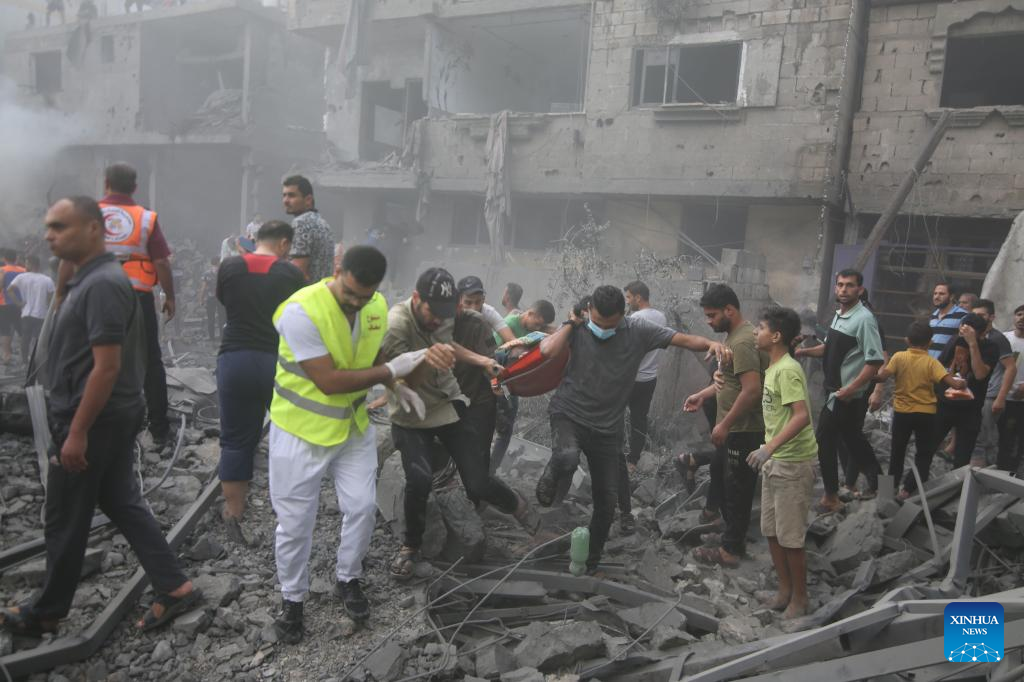Gaza’s only power station has stopped working after the fuel needed for generating electricity ran out on Wednesday, Gaza officials said, sparking great concern over the humanitarian situation in the enclave as the Israeli-Palestinian conflict rages on.

“The humanitarian situation in Gaza was extremely dire before these hostilities; now it will only deteriorate exponentially,” United Nations (UN) Secretary-General Antonio Guterres warned early this week.
INTENSIFIED CONFLICT
The Palestinian Islamic Resistance Movement (Hamas) on Saturday launched a surprise attack on southern Israeli towns adjacent to the Gaza Strip, prompting Israel to launch retaliatory strikes on Gaza.
Hamas military commander Mohammad Deif said the attack was in response to Israel’s blockade of Gaza, its frequent raids on the West Bank over the past year, its storming of the Al-Aqsa Mosque compound — a site holy to both Muslims and Jews — Israeli settlers’ attacks on Palestinians and the expansion of Israeli settlements.
In response to the attack, the Israeli military launched the operation “Swords of Iron,” carrying out dozens of airstrikes against Hamas targets in the Gaza Strip.
As of Thursday, the death toll of Palestinians from the ongoing Israeli airstrikes has reached 1,500 while about 6,600 Palestinians were wounded by the Israeli army, according to the Health Ministry in Gaza.
On the Israeli side, the number of fatalities due to the Hamas attack has reached at least 1,300 and the number of injured in Israel surpassed 3,000, Israel’s state-owned Kan TV news reported Thursday.
The United Nations Relief and Works Agency for Palestine Refugees (UNRWA) said in a statement on Wednesday that 11 of its employees have been killed in the Gaza Strip since Saturday.
DIRE HUMANITARIAN SITUATION
Shortly after the Hamas attack, Israel enforced “a complete siege” on the Gaza Strip, cutting off the water, electricity and fuel supply to the enclave. Those moves coupled with the ongoing airstrikes have made the already dire humanitarian situation in Gaza even worse.
The number of people displaced across Gaza has topped 263,000 with more than 175,000 of them taking shelter in the United Nations Relief and Works Agency for Palestine Refugees in the Near East (UNRWA) schools, said the UN Office for the Coordination of Humanitarian Affairs (OCHA) on Wednesday.
More than 1,000 housing units in Gaza have been destroyed, and some 560 have been severely damaged and rendered uninhabitable. All 13 hospitals and other health facilities in Gaza are only partially operational due to supply shortages and fuel rationing, said the OCHA.
The World Food Programme (WFP) has begun distributing food for up to 100,000 internally displaced people in Gaza, who are seeking refuge in UNRWA shelters, with fresh bread and canned food, said Stephane Dujarric, spokesman for the UN Secretary-General.
“Civilians must be respected and protected at all times. Civilian infrastructure must never be a target,” said Guterres, adding that medical equipment, food, fuel and other humanitarian supplies are desperately needed, along with access for humanitarian personnel.
Israel needs to respect international humanitarian law when it comes to defending itself on the ground during the ongoing Palestinian-Israeli conflict, High Representative of the European Union (EU) for Foreign Affairs and Security Policy Josep Borrell has said.